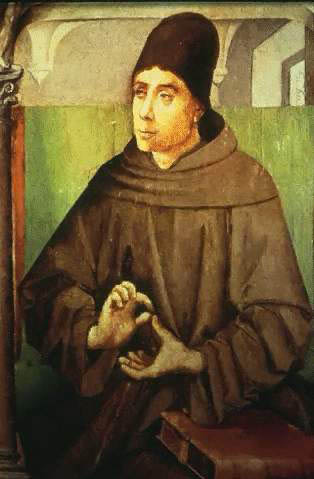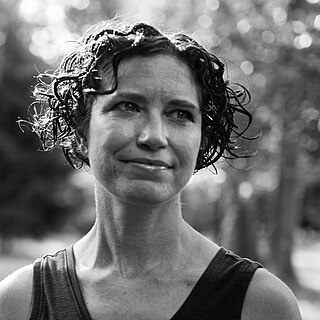Works and major themes
Pickstock has from the start of her career been associated with the radical orthodoxy movement, [18] on account of her collaboration with John Milbank, her then doctoral supervisor. [19] Her own academic work is both like and unlike that of her mentor: they are both identifiable as "post-modern critical Augustinian" theologians, [20] heavily influenced by both 20th-century French theory and the Christian Platonic tradition. At the same time, where Milbank's work (especially Theology and Social Theory) tends to focus on the historical critique and re-narration of other authors' projects, Pickstock's writing tends to be more question-oriented, more affirmative, and less narrative. Her work also tends to begin more frequently with direct reflection upon the writings of Plato, an engagement she has continued to pursue throughout her career. [21]
The dominant theme in Pickstock's writing thus far has been the way in which humans participate in the divine creation through language. Within this paradigm, at least four interlinked subthemes have found expression in her various writings: liturgy, music, repetition, and truth. First, the meaning and significance of liturgy, which was the subject of Pickstock's dissertation and first book, After Writing: On the Liturgical Consummation of Philosophy (1998). There, and in a number of related essays, she argues that language is fundamentally “doxological”: “that is to say, language exists primarily, and in the end only has meaning as, the praise of the divine” (xiii). Thus, liturgical speech is language par excellence, and the modern fall away from spoken, liturgical order into written metaphysical systems is the key to philosophy's failure over the last few centuries. The path of return, as Pickstock conceives it, runs through the postmodern (largely French) critique of modernity, then beyond to a non-foundational theology of liturgical encounter--an encounter with being through language.
A second, closely related theme of Pickstock's work has been the place of music in Western thought. Building on the foundation of Augustine's treatise De Musica, several of Pickstock's essays have argued that music is “the science that most leads toward theology," [22] provided it be properly conceived as a contemplative mode of measuring reality. While certain modern approaches to music, as narrated by Pickstock, have tended to distort its metaphysical character in various ways, certain 20th-century and contemporary composers such as Olivier Messiaen and James MacMillan have opened up possibilities of radical return. [23]
Third, Pickstock has focused in much of her writing on the metaphysical significance of the phenomenon of repetition. While the notion is already present in After Writing, [24] she focuses on it squarely in her 2013 book, Repetition and Identity, which opens with the claim that we define our own identities precisely in the act of identifying those of others. Somehow, identification of self and other are bound up together: “The external acts of recognition, and our internal access to a specific identity, seem to depend upon one another” (1). The book presents a phenomenological account of how this dual identification happens in human experience, and happens precisely through repetition. For the form of the other--of anything a person encounters or takes in--will necessarily strike the perceiver differently every time, so that each act of recognition circles back to the other's identity, but in a new way. Every recognition is thus both the same as and different from all previous perceptions. This habit of repetition in difference defines us: “the idea of forms and forces flowing into us from without, and there self-transmuting and pleating back upon themselves”--this “form[s] our subjectivity,” our sense of ourselves (17). At the same time, the identity of the other--of each identified thing--comes more and more fully into being through the repetitions of human language, which are always adding new details, new angles.
The fourth major theme in Pickstock's thought has been the metaphysics of truth. In her co-authored 2001 book, Truth in Aquinas, as well as her 2020 monograph, Aspects of Truth: A New Religious Metaphysics, Pickstock develops an approach to truth that is both philosophical and theological at once, ultimately because she thinks the two discourses cannot in fact be separated. At the heart of the latter book is the claim that “the epistemological approach to truth”--the dominant modern way that ever more carefully unpacks the conditions for truth's possibility--cannot in fact “yield truth” (x). This is because, for Pickstock, truth is always already metaphysical, referring to a way of being in relation to what is, and this primary relation of knower and known can never be reached by epistemological pathways. Now, given the postmodern deconstruction of modern epistemology, she believes the time is right for a radical return to “pre-modern metaphysical approaches to truth. . . . For such approaches,” she writes, “truth coincides with being as a ‘transcendental’, and yet it is surplus to being, insofar as being itself is taken to be manifestatory and expressive” (x). In other words, the human knower, in relation to being as such, always has something of his or her own to add, a new aspect, a fresh take, a singular angle of reception. Truth is thus ever growing, ever adding to the deposit of being by means of differentiated repetition.
Pickstock's project, finally, circles around the way that human experience, especially as mediated through language, music, art, works to extend the creation beyond what it now is, participating in the never-finished work of God.






